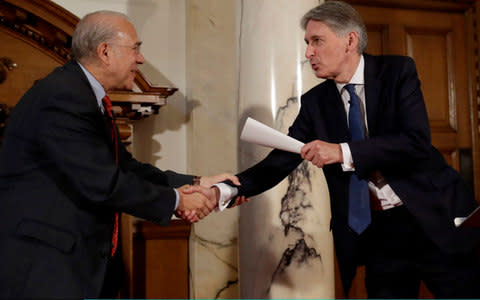Britain's economy will continue to grow even if it leaves the EU without a deal, OECD admits

Britain's economy will continue to grow next year even if the UK is forced to leave the EU without a deal, an influential think tank has said despite comparing Brexit to the Blitz.
The OECD, an organisation part-funded by Britain, warned in a gloomy report that Brexit could "stifle growth for years to come" and suggested a second referendum would have a "significant" positive impacton the economy.
However the organisation's own forecast suggested that even in the "least favourable scenario" of the UK leaving without a deal in 2019 the economy will grow by 1 per cent next year.

Philip Hammond, the Chancellor, faced a furious backlash from eurosceptic Tory MPs after helping launch the OECD's report in the Treasury.
The Chancellor tried to distance itself from the findings, insisting that the UK will leave the EU in 2019 and ruling out a second referendum.
However one Tory MP said: "He's associating himself with Project Fear all over again, it's shocking behaviour. He has to go".
Government sources suggested that Mr Hammond had been "ambushed" by the OECD and was unaware of the contents of the report until shortly before the launch.
The OECD said there is a risk of a "disorderly" Brexit, in which the UK leaves without a deal triggering an "adverse reaction" in the financial markets and pushing exchange rates to new lows.
It goes on to say:"In case Brexit gets reversed by political decision (change of majority, new referendum, etc.), the positive impact on growth would be significant." Angel Gurria, the Secretary-General of the OECD, said: “What was it Churchill said? Keep calm and carry on. It’s like in the Blitz. Except without the bombs.”
The OECD admitted that Brexit negotiations were difficult to forecast, and could "prove more favourable" than assumed in its report - boosting trade, investment and growth - but stressed that this would require "an ambitious EU-UK agreement and a transition period to allow for adjustment to the new agreement".
Gisela Stuart, a leading leave campaigner during the EU referendum, said: "It is laughable that the EU-funded OECD, at a time that is the most helpful possible for Brussels, has the gall to intervene in our negotiations and call for Brexit to be reversed.
"Instead of trying to hijack Brexit talks at this crucial stage, the OECD should urge its financial backers in the European Commission to negotiate in good faith and stop trying to bully the UK into submission."

 Yahoo News
Yahoo News 
